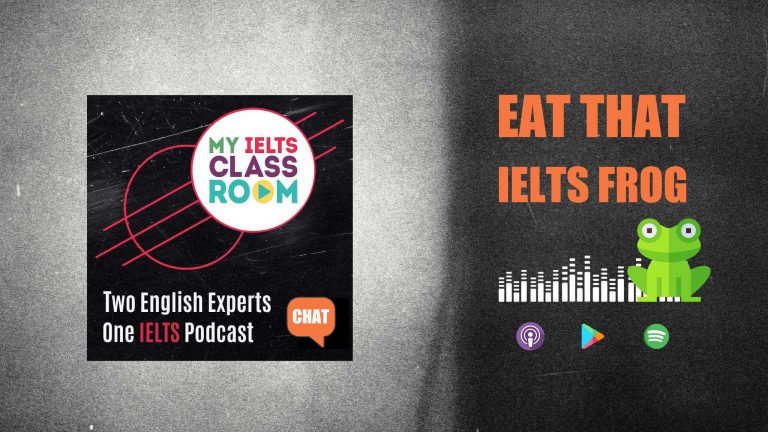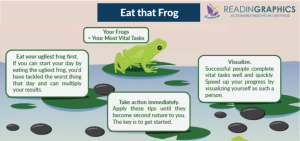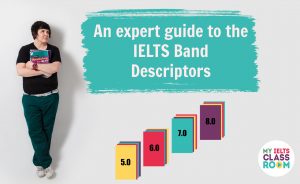
IELTS Procrastination – start eating those frogs!
IELTS Procrastination
Have you ever sat at your desk looking at the items on your To-Do list and thought, why? Why is it that I never have time to get everything done? Why is it that it is always the same two or three things left at the end of every week, which I never, no mater how good my intentions, get round to finishing? Well my friend, you are not alone. In fact, this week’s episode is as much for me as it is for you, as I have decided that enough is enough. It is time to stop procrastinating and start doing! That means no more marketing procrastination for me, and no more IELTS procrastination for you.
And to help us make that change, today we will look at there anti-procrastination techniques that you can employ to help you start moving towards your IELTS goals. In other words, it is time to start eating those frogs (which you will understand when you start the episode!) 🐸
Subscribe to My IELTS Classroom podcast on Apple podcasts here
Subscribe to My IELTS Classroom on Google podcasts here
My IELTS Classroom Podcast Episode 59 Summary: IELTS Procrastination
05:49 – 15:30 Anti IELTS procrastination Technique 1 – Eat that Frog!
OK – that might sound a little bit strange, but this is the advice given in Brian Tracy’s book Eat that frog: 21 great ways to stop procrastinating. The concept is pretty simple – your frogs are your most vital tasks. They may be ugly. You may not even want to look at them let alone eat them, but if you can start every day by “eating” your ugliest frog (i.e. doing the most difficult task), then the worst of your day would be over and you would be closer to your goal before lunchtime. Now, this is a pretty basic concept, but I have to say that it definitely works.
This is because in the morning you have most energy and brain-power to tackle the tasks that you know are most difficult or urgent.
Tracy also points to the Pareto Principle, or the 80/20 RULE TO EVERYTHING, which states that 20% of your activities will account for 80% of your results. This means that you want to make sure that the frogs you eat are those that actually take you towards your goal.

What does mean for your IELTS procrastination?
Well, as much as I hate to say this, I would consider putting your IELTS preparation at the start of each day. I know from experience that if you work a 9 – 5 job, then even with the best intentions in the world, it can be hard to have the energy late in the evening to focus on study.
Even if you are an evening person like me, it may be a good idea to start setting your alarm an hour early and getting your IELTS frog eaten right at the start of the day.
You may also want to analyse what you 20% for the IELTS test is. By this I mean, what aspects of your English or Academic skills need the most improvement and would, therefore, have the biggest impact on your score. I hate to say it, but these may not be the skills that you enjoy practicing.
Yes, you may love speaking in English, but if you can already reach your target score here, maybe what you need to really focus on is your punctuation or your ability to reference. Be honest about your strengths and weaknesses and eat your frogs! 🐸
15:31 – 32:36 Anti IELTS procrastination Technique 2 – The ONE thing
Our next anti-IELTS procrastination technique is from Gary Keller, who argues that success comes when you narrowing your focus to concentrate on one thing and one thing only. His theory is based on what he calls five high ideas:
- A balanced life is a lie. If you try to spread yourself too thin and include too many different things in your life, nothing gets the attention it deserves. In fact, no matter how hard you try, there will always be things left unfinished at the end of your day, week, month, or year, and you will always be left a sense of failure. The only logical solution to this problem and to ensure that you can achieve extra-ordinary results is to narrow your focus and put your effort into the ONE thing that matters most.
- Not everything matters equally. Not all tasks are equal, We have to prioritise those tasks that take us where you want to go. There are things that we do every day that keep us in the same place, and there are things that we do that can help us to progress in life. We need to care less about the former and more about the latter.
- Multi-tasking is a lie. When you try to do more than one thing at once, you do both things badly. Research shows that workers are interrupted every 11 minutes and then spend almost a third of their day recovering from these distractions.
- Discipline is a result of habit. As Nick and I discussed in our 30-day motivation challenge, it takes time to build new habits. However, once you make a task part of your daily routine, you will need far less will-power to complete it.
- Willpower is a finite resource. Yes, success is tied to willpower, but most of us don’t realise that our will-power is not the same throughout the day. The sad truth is that the more we use our mind, the less mind power we have. So, if you want to get the most out of your day, do your most important work—your ONE Thing—early, before your willpower has run out (which brings us back to eating frogs in the morning! 🐸 )
What does mean for your IELTS procrastination?
Well, I guess the most obvious take-away here is that if you are serious about passing IELTS in a relatively short timeframe, then you may have to put it above everything else in your life for 2 – 3 months. I know that this isn’t fun, but if you have a life-changing goal like studying abroad or migrating and the only thing stopping you is IELTS, then putting your preparation above and beyond everything else may be a good idea.
Also, when you are planning your study, try to find a block of time that you can use to focus on IELTS without interruption That might mean protecting yourself from external distractions like kids or from internal ones like checking your phon every 5 minutes. Try to work through one lesson from start to finish without your attention being lost (for example by working through one of our free IELTS video lessons)
Want to know how the examiner will apply the band descriptors when marking your IELTS essay?
Then download a copy of our FREE e-book, which explains how each of the four marking criteria is applied and includes the most common errors made by test-takers. Just click here for your copy.

32:36 – END Anti IELTS procrastination Technique 3 – 168 hours
There are 168 hours in a week and, according to author Laura Vanderkam, this is MORE than enough time to get all of our tasks done. Now, don’t worry. 168 hours book is NOT about you doing MORE in a day. It is a book that makes you do MORE of the things that will help you to progress. In other words, it is about using the hours that you waste on social media or cleaning your home (yes, you read that right, she thinks cleaning is a waste of time!) on tasks that are more productive.
- Keep an accurate track of your time. This week, write down hour by hour everything you do during the day (and I mean everything!) so you can see how you’re actually spending your time. It may shock you to discover that you actually spend only 20 minutes cooking, but 3 hours doom-scrolling through Twitter or YouTube! Then evaluate what you want to keep and what you want to replace with more productive activities.
- Stop doing pretend work. One interesting thing about people who procrastinate is that they not usually lazy. The problem is that they spend too much time working in the wrong things. Are you spending a lot of time doing meaningless housework, or having long conference calls that could be finished in ten minutes if you got right on task? Try to make sure that when you do actually work it is on the right things (i.e. the 20/80 principle!).
- Decide what you can off-load. Laura Vanderkam is an enormous fan of outsourcing as much as possible. In other words, if you can pay somebody to do a task for you, then you should do it! Your time is valuable so paying somebody to do the less important things can be a good exchange (but only if you can afford it!)
What does mean for your IELTS procrastination?
If you are struggling to find the time to prepare for IELTS, take a look at your day to see where you can “save” time. Sure, you work, you go to the gym, you sleep, you look after your kids (maybe not in that order!) and all of those things are necessary. But what are you doing in the other hours? What I call the “lost hours”. Maybe you can find an app that limits your social media use or turn your TV on for just one hour a day. If the busy working mothers that I work with are able to find time to study for IELTS, then so can you! Just listen to Zina’s story if you want some inspiration for this!
So, this week, I am determined to eat my frogs and make better use of the hours I have in the day. Want to know how I get on? Well, make sure that you follow us on Facebook and Instagram so that you can see me do my best to finally clear my To-Do list. Even better, why not email me with the list of “frogs” that you have eaten this week? That will inspire both me and you! You can reach my at hello@myieltclassroom.com.
